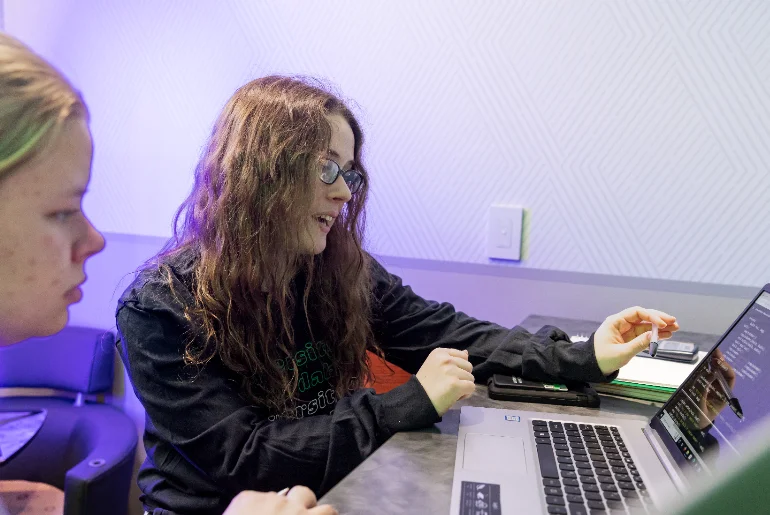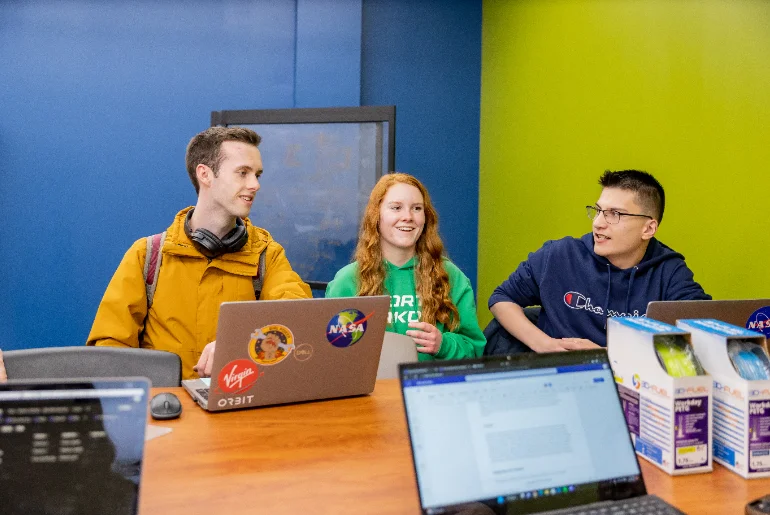
How to Become a Software Engineer: Steps Toward Your Career
Becoming a software engineer involves obtaining a relevant degree, mastering key programming languages, gaining experience and continuously updating your skills.
Request Information
As you read these words on your screen—be it a phone, computer or another digital device—the intricate dance of pixels, text and images comes together seamlessly to convey information. This digital experience, fundamental to our everyday lives, is made possible by the ingenuity of software engineering.
Beyond this moment, software engineering shapes countless facets of our daily encounters, from mobile applications that streamline our tasks to the complex systems driving internet connectivity. It’s the unseen force that propels the technological marvels we often take for granted. Curious to explore this profession? Read on and discover how to become a software engineer and learn more about its impact on the technology of our daily existence.
Key Takeaways
- Obtaining a relevant degree, such as in computer science or software engineering, is a foundational step toward a career in software engineering.
- Mastering key programming languages and continuously updating your skills are essential for success in the field.
- Gaining practical experience through internships, personal projects, or contributions to real-world software development is crucial for building a strong portfolio.
Steps to Become a Software Engineer
Employers need software engineers with a strong working knowledge of programming languages, software development methodologies, and industry-standard tools, along with hands-on experience designing, building, and maintaining software applications. While there are self-taught engineers who have successfully built their careers by learning independently, most professionals in this field develop their foundational IT skills through formal education, typically by earning a bachelor's degree in computer science or a related discipline.
Beyond academic learning, gaining practical experience through real-world projects, internships, or personal coding endeavors is equally important in bridging the gap between theoretical knowledge and industry expectations.
If you are curious to learn more about what it takes to become a software engineer, then keep on reading.
Earn a Bachelor’s Degree in Computer Science
If you're serious about becoming a software engineer, one of the best ways to build a strong foundation is by earning a bachelor's degree in computer science or a related field. A bachelor's degree gives you access to structured learning, access to experienced professors, and opportunities to collaborate with peers who share your passion for problem-solving and innovation.
During your undergraduate years, you'll dive deep into the core concepts that every software engineer needs to know. Your coursework will cover fundamental programming languages like Python, Java, and C++, teaching you how to write clean, efficient code. You'll explore algorithms and data structures—arguably the heart of software engineering—so you can understand how to optimize programs for speed and efficiency.
If you're willing to put in the work, this degree can open doors to a rewarding career where you get to build, innovate, and shape the future of technology.
Gain Practical Experience Through Projects and Internships
Another major advantage of pursuing a degree is the access to internships and networking opportunities. Universities often partner with tech companies to provide students with real-world industry experience, which is crucial when applying for jobs after graduation.

Employers, more often than not, want to see what you've built, how you solve problems, and whether you can apply your knowledge to real-world situations. That's where projects and internships come in. Internships give you the opportunity to work in a professional setting, collaborate with experienced developers, and see firsthand how software engineering teams function. Some companies even use internships as a way to recruit full-time employees, so performing well during an internship can sometimes lead to a job offer before graduation.
Not every student lands an internship right away, but that doesn't mean you can't gain practical experience. Personal projects, open-source contributions, and freelance work are excellent ways to demonstrate your skills.
Choose a Specialization in Software Engineering
Software engineering is a broad field, and as you progress in your learning journey, you may find yourself drawn to a specific area that aligns with your interests and skills. Specializing allows you to develop expertise in a particular domain, making you more valuable in the job market and better suited for roles that fit your strengths.
Software engineering offers various specializations, each catering to different interests and skill sets:
- Frontend Development: Focuses on building user interfaces with technologies like HTML, CSS, JavaScript, and frameworks such as React and Vue.js. Ideal for those who enjoy design and user experience.
- Backend Development: Handles server logic, databases, and APIs using Node.js, Python, Java, and databases like MySQL and MongoDB. Suited for those who prefer system architecture and data management.
- Full-Stack Development: Combines frontend and backend skills, allowing engineers to build entire applications using stacks like MERN or Django.
- Mobile Development: Specializes in iOS and Android apps using Swift, Kotlin, Flutter, or React Native, with growing demand across industries.
- AI & Machine Learning: Focuses on automation, data analysis, and predictive modeling with tools like TensorFlow and PyTorch.
- Cloud Computing & DevOps: Ensures efficient application deployment and scalability using AWS, Google Cloud, Docker, and Kubernetes. Ideal for infrastructure optimization.
- Cybersecurity: Protects systems from cyber threats through encryption, penetration testing, and risk management. Suitable for those interested in ethical hacking and security.
Consider Coding Bootcamps or Certifications for Additional Skills
While a degree provides a strong foundation, the tech field is constantly evolving, and additional training through coding bootcamps and certifications can help you gain specialized skills, making you more attractive to employers.
For those interested in cloud computing, certifications like the AWS Certified Developer – Associate or Google Cloud Professional Cloud Developer validate your ability to design, deploy, and maintain applications on cloud platforms.
If you're leaning toward data science, the Google Professional Data Engineer or Microsoft Certified: Azure Data Scientist Associate certifications can strengthen your knowledge of machine learning models, big data processing, and cloud-based analytics.
Cybersecurity specialists, on the other hand, can benefit from credentials like the Certified Ethical Hacker (CEH) or CompTIA Security+, which focus on ethical hacking, network security, and risk management.
Skills of a Software Engineer
Becoming a successful software engineer demands a mix of technical expertise, problem-solving abilities, and strong communication skills.
In addition to understanding programming languages, software engineers must also know how to develop efficient, scalable solutions while working collaboratively.
Below are some of the key skills that every software engineer should develop, starting with:
- Proficiency in working with programming languages such as Java, Python, C++, or JavaScript
- Knowledge of various software development methodologies as well as database systems
- Proficiency in designing and implementing efficient algorithms to solve complex problems and optimize software performance
- Problem-solving and critical-thinking skills
- Familiarity with cloud platforms
- Collaboration and effective communication within development teams
- Understanding of version control systems
- Familiarity with software testing and debugging techniques

Developing these skills takes time, but continuous learning, hands-on experience, and staying engaged with industry trends will help aspiring software engineers like you build a strong foundation for a successful career.
Salary of a Software Engineer
Software engineering is a highly lucrative field, with salaries varying based on experience, specialization, and industry. As of May 2024, the median annual wage for software developers was $133,080. Entry-level developers in the lowest 10% earned below $79,850, whereas the top 10% made over $211,450.
Salaries can also vary depending on the industry, with developers working in sectors such as finance, healthcare, and technology often commanding higher pay.
Why Choosing an Accredited Degree Program Matters
Making the right choice now can set you up for long-term success in software engineering, giving you a competitive edge when applying for jobs and ensuring that your education meets the standards required for a thriving career.
That’s why, when choosing a degree program to become a software engineer, it's important to make sure the program is accredited since it directly impacts your education, career opportunities, and future growth. Accreditation ensures that the curriculum meets industry standards, meaning you'll gain the skills and knowledge that top employers look for in software engineers. Companies often prioritize candidates with degrees from accredited institutions because they trust the quality of education provided. Plus, if you ever decide to further your education, having an accredited degree makes it much easier to transfer credits or pursue advanced certifications.
The Bottom Line
Becoming a software engineer involves a sequence of key steps—acquiring a solid educational foundation, obtaining relevant certifications to showcase specialized skills and gaining hands-on experience through internships, personal projects and contributions to real-world software development. When pursued with dedication and enthusiasm, these steps not only set the stage for a rewarding career but also position individuals to navigate the field of software engineering with confidence.
If you’re intrigued by the prospect of crafting digital solutions and pushing the boundaries of technology, now is the time to take that leap. Join the field of software engineering, where every line of code contributes to shaping the digital future.
Whether you’re starting your educational journey or considering advanced degrees, we invite you to explore our comprehensive degree programs in computer science. From a bachelor’s to a master’s or even a Ph.D., our programs cater to students at various stages of their academic pursuits, offering a structured pathway to excellence in software engineering and many other IT roles.
FAQs
Becoming a software engineer can be challenging, largely due to the technical complexity and the ever-evolving nature of the IT field. Beginners may find the depth of programming languages, software development processes and the need for continual learning to be daunting. However, if you have a genuine interest in IT and software development, your passion can make the journey much more manageable. With hard work, dedication and a commitment to continuous learning, overcoming challenges becomes a rewarding part of the process.
The time it takes to become a software engineer can vary. The traditional path typically involves obtaining a bachelor’s degree, which usually takes four years. However, alternative routes can influence the duration of your journey, making it longer or shorter than that.
Yes, it is possible to become a software engineer without a formal degree through self-directed learning, coding bootcamps or online courses. However, while these paths can provide valuable skills, pursuing a traditional degree is often the most beneficial choice since, on top of offering structured and comprehensive education, it also provides a recognized credential that can enhance career prospects and open doors to a broader range of opportunities.
The work environment for a software engineer is typically flexible and collaborative, with opportunities to work in offices, remotely, or in hybrid settings. The atmosphere can range from structured corporate settings to relaxed startup cultures, depending on the company.